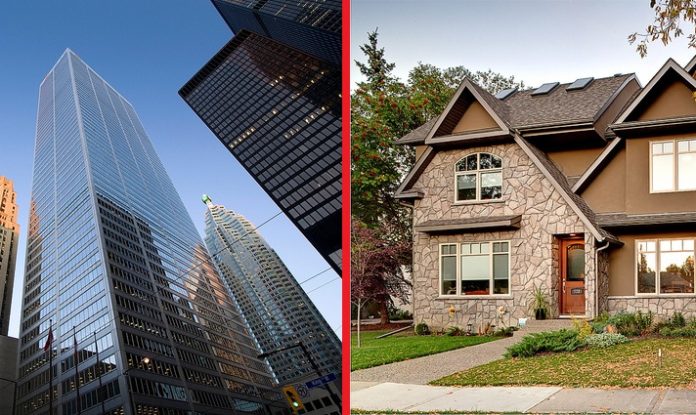Most people who get into commercial or residential investments try to figure out which one is the safest bet. The answer is both have their ups and downs. Each have different characteristics that requires different paths to achieving the same objectives. Both can be great investment options, but it really depends on what you want to achieve, and does the benefit outweigh the risks.
Commercial Pros & Cons
Lots of people are attracted to commercial real estate because of the promise of steady, strong revenue from tenants and shops. Plus insurance covered by your tenants means you don’t pay as much for insurance. Any chance you get to invest money, charge money, and keep expenses low you’ll attract a lot of attention. But don’t jump full steam ahead without knowing the drawbacks.
Capital growth potential is hard to move when investing in commercial real estate. If you’re wanting to expand your commercial real estate portfolio get prepared for what you might find. Don’t be surprised to run into increased land value and deprecated building value. Even though your building holds the majority of your property value your building is always depreciating. The key to making good money with commercial real estate is to find high paying renters, and fill up your storefronts. But if your property isn’t in the “it” area you’re out of luck, high paying renters will be hard to attract.
Best Approach: Commercial
Best place to invest in commercial property is in the ever expanding suburbs. Tapping into population growth trends can really help set your property up for long term success. But the drawback is every commercial real estate investor fights for the same “it” properties. The war between investors could artificially inflate the price and leave you on the sidelines. If you lose good property and invest in real estate on the outskirts of town your growth could take a big hit waiting for the population to catch up.
Residential Pros & Cons
Residential property on the other hand doesn’t produce as high of an income stream when compared to commercial property. It’s almost impossible to increase rent without spending more money on your property. Plus you might lose tenants if they can’t pay the increased rent. Being a landlord also increases expenses from building maintenance, building insurance, paying for staff, and paying for every little thing your tenants break through normal wear and tear. All those things combined and your cash flow becomes even more diluted.
So what attracts residential real estate investors? For one land, not the building, usually makes up the majority of the property value. Everyone wants to live closer to town, and the more crowded it becomes the more you can charge for rent. Plus it’s so much easier to find residential tenets because everyone needs a place to call home. Attracting tenets is as easy as having a good location, and increasing rent can be as easy as having a good location.
Best Approach: Residential
Invest in residential properties in areas with consistent population growth. Demand for homes increase as population growth snatches up available housing. Plus all the demand raises land worth meaning your property remain valuable long into the foreseeable future. Real estate companies like, “HomeVestors” have been successful at teaching people how to flip houses. So if you need a half way step to getting into the business I would suggest getting involved with a reputable company.
Commercial or Residential?
The best tip for getting into the business is to invest in commercial property if you have more cash to invest, and residential properties if you don’t. Try and purchase properties with good land value because the capital growth based on the property will balance out interest from the loan. Plus your interest payments are tax deductible since your property produces income. But if you have a significant amount of money to invest, and you’re looking to generate larger amounts of income focus on commercial property. Either way borrowing low, finding a good location, and attracting good tenants is a recipe for success.



